Organization
Samarthyam
Location
Six districts, namely Dungarpur, Jaipur, Sirhoi, Udaipur, Bikaner and Chittaurgarh of Rajasthan State in India
Duration
March 2021 - May 2022
Target group
Persons with disabilities, with particular emphasis on women with disabilities; OPDs and All People’s Network Organization (APNO), a state-level disability network; government officials of various departments that provide specific services to persons with disabilities; and community-based self-help groups (SHGs).
A. Project design
a. Context and background
Persons with disabilities in India often face several issues that hinder their meaningful participation in society, such as the lack of education and employment opportunities, social stigma and discrimination, as well as invisibility and voicelessness.
At the subnational level, OPDs and government agencies in India are often constrained by a lack of awareness of updated national laws and policies, as well as the latest approaches to disability inclusion and accessibility enhancement. Additionally, more needs to be done to strengthen community and institutional structures, processes and mechanisms for more effective advocacy for disability inclusion.
Persons with disabilities are often not represented in local government bodies and thus remain at serious risk of exclusion and marginalization. Women with disabilities are particularly disadvantaged as they face multiple forms of discrimination based on gender and disability. The COVID-19 pandemic has further exacerbated the challenging situation faced by persons with disabilities at the local level.
The project aims to raise awareness among decision-makers, including government officials and community leaders, so that they will better understand the situation of persons with disabilities amid the pandemic and refer to disability-related legislation, policies, programmes and campaigns to support and empower persons with disabilities. Without disability mainstreaming into institutional and community structures, processes and mechanisms, persons with disabilities face the risk of being left behind in the response to COVID-19.
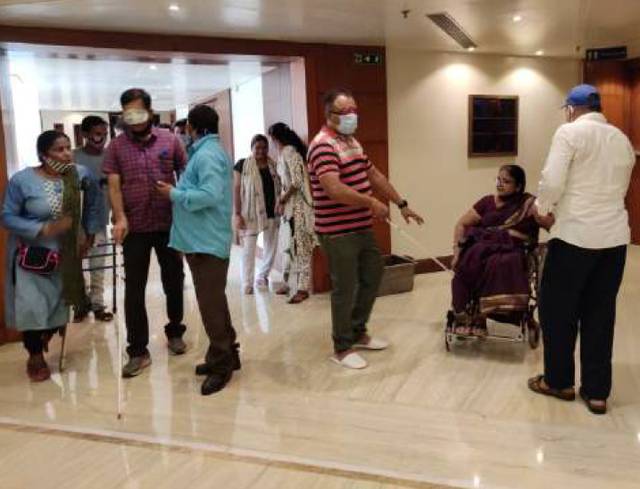

Training in disability inclusion
b. Objective and expected outputs
Objective: To strengthen the capacities of persons with disabilities, OPDs, mainstream community networks and government agencies in India to integrate the promotion of disability rights and disability inclusion into institutional and community structures, processes and mechanisms, thereby contributing to an improved standard of living for persons with disabilities.
Outputs:
- Strengthened capacity of OPDs and government agencies to advocate for disability rights and disability inclusion at the district level;
- Strengthened institutional capacities, mechanisms and processes for OPDs and government agencies to conduct accessibility audits at the district level;
- Increased participation of women with disabilities in district-level mainstream community networks and OPDs;
- Increased representation of persons with disabilities in district-level government committees.
c. Partnerships
Building on the partnerships with the state and district administration and the Principal Secretary in Rajasthan, this project successfully provided training to district authorities and OPDs. A directive was sent to the State Commissioner for Persons with Disabilities to ensure smooth project implementation in six districts. Importantly, six District Collector Offices permitted the conduct of accessibility audits in 35 prominent buildings. The Public Works Department nominated architects to develop drawings based on the results of the accessibility audits in Jaipur.
The district administration supported OPDs’ active participation in field camps, meetings and events. APNO, a state-level OPD network, assisted OPD focal points in organizing advocacy campaigns and following up with the district administration on the implementation of action plans developed under this project. Manjari Foundation, an umbrella CSO for 33,000 self-help groups, helped ensure the inclusion of OPD members in SHG activities.

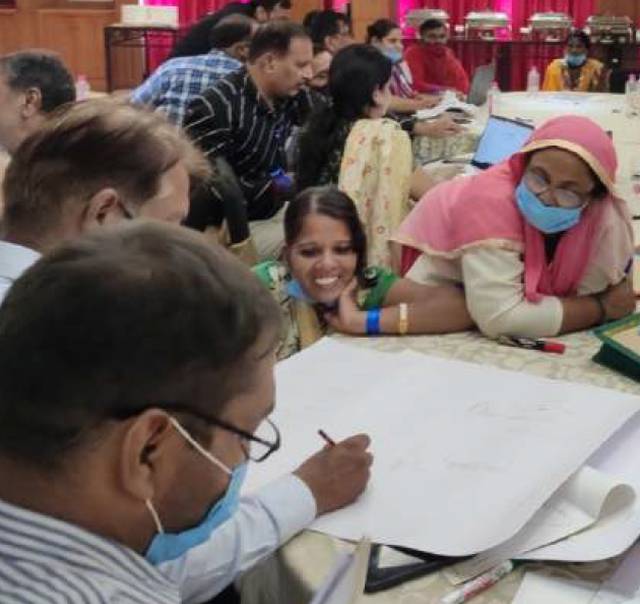


Training in accessibility audit
B. Achievements and lessons learned
a. Impact and results
Training in disability-related legislation, policies, campaigns and programmes was delivered to 27 OPD members (women with disabilities – 50 per cent) and 18 government officials (women – 30 per cent). A few more government officials, including the Principal Secretary, Directorate of Specially Abled, Government of Rajasthan, were invited to the inauguration session. The training programmes provided a platform for participants to share information, understand each other’s challenges, explore joint solutions and build effective partnerships for resolving issues. OPD members and government officials developed joint action plans to advance disability-inclusive development, covering the areas of rehabilitation, health, education, livelihood and community development.
Enhanced representation of OPD members was found in 26 district- and 17 state-level meetings. As part of the state government campaign “Prashasan Gaon ke Saath”, a total of 116 disability-specific camps were organized during October-December 2021 by the district administration to increase access for persons with disabilities to social protection benefits. OPDs were invited to participate in 14 government workshops and conducted 47 field visits with government officials.
As a result, 668 persons with disabilities (women - 58 per cent) received their pending disability certificates, 910 persons with disabilities (women - 50 per cent) started receiving disability pensions, 2,914 persons with disabilities (women - 46 per cent) received assistive devices to ensure improved mobility, households of 404 persons with disabilities (women - 44 per cent) received job cards under the unemployment benefit scheme (MGNREGA), and 6,421 persons with disabilities (women - 41 per cent) received benefits of several other social protection schemes.
Training in accessibility audit was delivered to 26 OPD members (women - 50 per cent) and 35 architects and engineers from Public Works Departments and Directorate of Local Bodies (women - 20 per cent). More engineers, including the Chief Engineer of the Central Public Works Department, attended the opening session. District-level accessibility audit teams were formed to undertake audits of 35 key government buildings. Action plans to improve accessibility features of these buildings were developed based on the results of the accessibility audits.
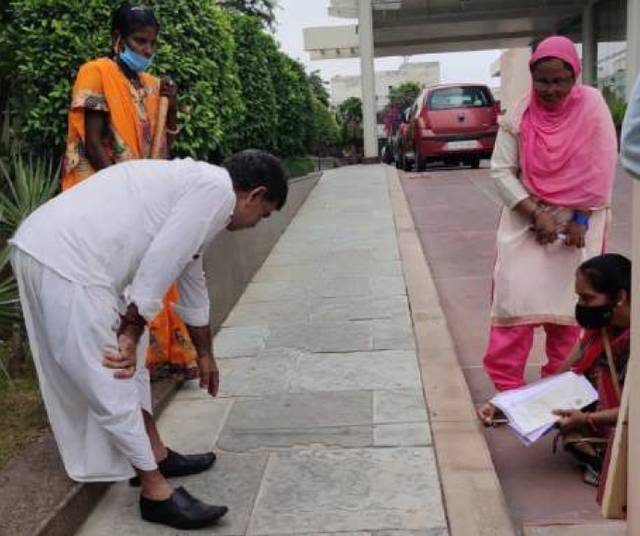
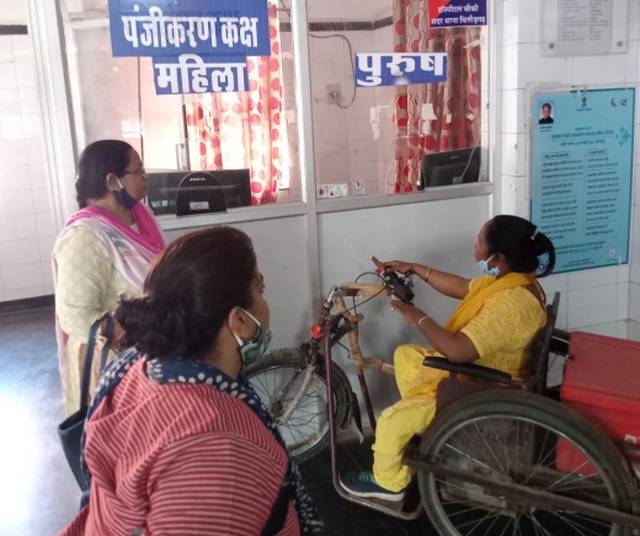

Conduct of accessibility audits
Training in gender equality and women’s empowerment was delivered to 26 OPD members (women - 43 per cent) and 19 SHG members (women - 58 per cent). SHG by-laws were amended through a gender-responsive and disability-inclusive lens, focusing on skills training for women with disabilities. A few district government officers from various departments also participated in the opening session to get an overview of the challenges faced by persons with disabilities in mainstream networks and SHGs. District-level focal points led by women with disabilities were identified to follow up on the implementation of action plans prepared during the training, to further promote the participation of women with disabilities in SHGs. As a result, 80 persons with disabilities (women - 38 per cent) joined SHGs.
Establishment of district-level monitoring committees was facilitated by Samarthyam and OPD members who conducted active advocacy with the district administration. Six districts received orders from the State Commissioner for Persons with Disabilities, and six district committees were formed (District Collector as Chairman and one person with a disability appointed for a term of five years). These committees aim to discuss and address issues related to persons with disabilities, such as accessibility audits and grievance redressal. They also monitor the implementation of disability-related schemes and programmes. Meetings of the committees will be held on a quarterly basis.
b. Challenges
The biggest challenge was to raise awareness of district government authorities on the importance of disability issues. For example, some district officials were not willing to issue formal letters or orders to permit accessibility audits of government buildings. They asked for other states’ precedence, which caused a delay in project implementation. As a result of persistent follow-up by OPDs, one proactive district issued the permission letter, expediting the approval process in other project locations. To enhance skills and knowledge of government officials on disability rights and inclusion, an orientation session on the Rights of Persons with Disabilities Act 2016 was organized. Moreover, close partnerships with OPDs were forged to bridge information gaps and fast-track service delivery for persons with disabilities.
Sustaining the interest of OPDs to continue conducting activities was a constant challenge as OPD members volunteered their time and efforts. To address this issue, the Samarthyam team created WhatsApp groups and convened virtual monthly meetings to facilitate learning and sharing. OPD members within the groups could inspire and support each other.
The COVID-19 pandemic continued to be a challenge, which delayed several activities at the field level. With additional efforts, focal point persons and district teams closely monitored the situation on the ground and completed most activities in time.

Training in gender equality and women’s empowerment

Woman with a disability working in the community
c. Sustainability
The project has built long-lasting partnerships among OPDs, SHGs and government authorities through joint training and SHG by-law amendments. Government officials have been sensitized to disability-related issues and initiated the registration of persons with disabilities into the social protection service network. This will ensure persons with disabilities have continued access to social protection benefits. Notably, district-level monitoring committees have been established in all six districts, consisting of the District Collector, representatives of government departments and one person with a disability, to promote disability-inclusive policymaking and ongoing partnerships in the upcoming five years.
With accessibility audits conducted, action plans developed and access audit reports submitted to six District Collectors, government officials are committed to improving the accessibility of the physical environment. For example, the Office of Chief Architect, Public Works Department, aims to ensure accessibility compliance in the design of buildings. The district administration plans to conduct accessibility audits of more buildings to align with the flagship Accessible India Campaign.
Government engineers and architects, jointly with OPD members, are constantly following up on accessibility compliance of buildings under construction in their respective districts. For example, in Jaipur, the team conducted an accessibility audit of a key government building under construction, showcasing their commitment and enthusiasm to make their district fully accessible.
Advocacy skills acquired by OPD members through the training programmes can help them get recommendation letters from government departments, which will serve as networking and advocacy tools even when the officials are transferred.


Formation of district-level monitoring committee
d. Good practices and lessons learned
Building rapport with government officials and SHG members is the unique selling proposition of this project, which resulted in an enhanced commitment to empowering persons with disabilities. Joint training of OPD members and those without disabilities provided an opportunity for participants to understand each other’s strengths and limitations, build cordial relations and collaborate to work towards a common goal.
Disability-specific camps organized by district authorities were conceived as a one-stop forum to connect persons with disabilities with decision-makers, enhance access for persons with disabilities to social protection benefits and increase the visibility of women with disabilities in community networks and OPDs. OPDs participating in the project recommended organizing such camps on a monthly basis.
OPDs played an important role in mobilizing resources to ensure the rights of persons with disabilities were recognized and honoured. Facilitating the learning, sharing and networking of OPDs can maximize their contributions to disability-inclusive development.
Women with disabilities have been empowered to be self-advocates who are active on social media. They have got membership in government bodies such as the Road Safety Committee, Western Railways Advisory Board and Inclusive Education Committee through OPDs’ nominations and advocated for inclusive decision-making.
It is critical to enable persons with disabilities to use virtual platforms and social media for advocacy purposes. Although a few persons with disabilities may be aware of their rights and entitlements, many are not familiar with government policies and the advocacy and digital skills required to secure those rights. Persons with disabilities residing in rural areas face further difficulties in reaching out to government departments and advocating for disability rights and inclusion. The power of social media can be utilized, especially during the pandemic, to support sensitization campaigns and service delivery mechanisms.
C. Feedback and resources
a. Voices of participants
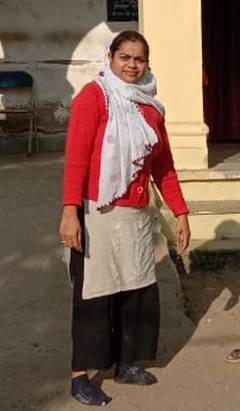
“This project has a transformational impact on our lives. The training has unleashed the untapped potential of women with disabilities, and I have realized that ‘we too’ have the right to play a full and active part in society. I have new wings of confidence, leadership and decision-making now. Above all, I am an accessibility auditor with technical expertise to guide architects and engineers.”
---Honey, with a physical disability, OPD member, Dungarpur, Rajasthan

“By networking with government authorities, I learned effective ways of advocacy. Now I challenge my male colleagues in the OPD and take decisions on field visits, community training, disability camps and meetings. I train women with disabilities to become financially empowered and earn a decent income by joining local self-help groups. I am proud to be an advisor to several government committees. We conduct accessibility audits and advocate for ‘buildings for all’. Together we celebrate our strength, abilities, resilience and victories.”
---Preeti, with a physical disability, OPD leader, running a Community Kitchen, Chittorgarh, Rajasthan

“Government officers’ attitudes have changed. People have started recognizing my work as an OPD leader. I have become quite popular, and this is what I treasure the most. I learned how to lead active advocacy and stand up for the rights of others. For me, now, there is no looking back. Today, I stand with my chin high and confidence in my heart.”
---Shishpal, with dwarfism, OPD member, Bikaner, Rajasthan
b. Resources
Presentation at ESCAP’s Regional Forum on Advancing Disability-Inclusive Development: Leadership and Participation of Persons with Disabilities toward an Inclusive, Accessible and Sustainable Post-COVID-19 World: https://www.unescap.org/events/2021/regional-forum-advancing-disability-inclusive-development-leadership-and-participation#
For more information, please visit Samarthyam’s website: https://samarthyam.com/make-right-real.html






